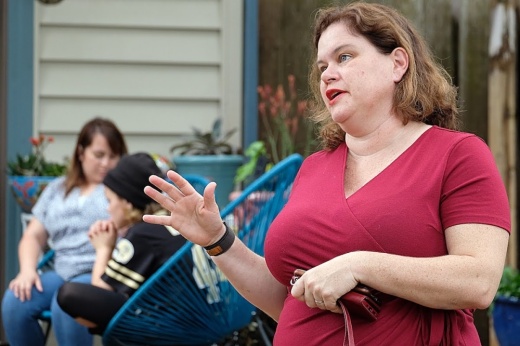A physician diagnosed him with autism, attention-deficit hyperactivity disorder, dysgraphia and auditory impairment. At home, he receives special education therapy, but for a student to receive services from AISD, the district must evaluate them. Olmsted is one of the students waiting for AISD to complete their evaluation, and the district is facing a state conservatorship over its backlog.
As of March 20, more than 1,800 special education evaluations were overdue, according to Texas Education Agency records. A TEA report released on March 31 cited 40 instances of “systemic noncompliance” where the district failed to meet its special education obligations in a timely manner.
While the district awaits a review by the TEA—asking for a less severe form of intervention—families are making choices for their students. Hendrix said the process dragged out for more than a year. She made the decision to move him to the Texas School for the Deaf but says she has to wait for the evaluation to be completed.
Another AISD parent, Marie Le, said her 17-year-old daughter has also waited more than a year for a completed special education evaluation. Le said she plans to fight for her daughter, whom she believes is not ready to move beyond high school due to the district denying her the special education services she needs. Le said the report she received from the district is incorrect as it does not include all of her daughter’s disabilities nor needed accommodations.
“She’s so close to graduating and not at all prepared,” Le said.
What happened
On March 31, TEA officials announced they would seek a conservatorship over AISD. Under the conservatorship, the board and interim superintendent would remain in place, but the conservators would have decision powers.
AISD has failed to correct complaints against the district since July 2019, according to the TEA report. Since then, a lawsuit was filed in 2021 by Disability Rights Texas—a nonprofit advocating for people with disabilities.
DRT attorney Kym Davis Rogers said as a result of the delayed evaluations, “many students with disabilities did not receive any special education services, and others received services based on out-of-date evaluations.”
Rogers said the “situation has only gotten worse” each year.
“The critical personnel shortage, particularly in employing the needed numbers and quality of licensed specialists in school psychology, presents a maddingly intractable situation that is the focus of the daily work of the department,” said Frances Stetson of Stetson & Associates—the independent consulting firm hired by AISD to conduct a review of the special education department.
How we got here
Heather Merritt, a former AISD special education teacher at Travis Early College High School who still works in the district, has worked for AISD since 2004.
“It has been difficult, and we recognize that. We are ready and willing to help our students with disabilities, and we want to make sure they have the services they need,” Merritt said.
At an April 3 board meeting, AISD attorney Pam Kaminsky said there were several factors that contributed to the backlog of evaluations for special education, including an evaluator shortage and an increase in referral rates for the department.
Kaminsky said Austin was not alone in struggling to conduct evaluations during the pandemic.
As of press time May 22, AISD interim Superintendent Matias Segura and board President Arati Singh did not return requests for comment.
The plan
Members of a labor union for AISD employees, Education Austin, spoke out against the TEA’s plan at a press conference April 3.
“What we need from the state is money—money to fill the positions to support our kids in this district,” Education Austin President Ken Zarifis said.
Zarifis said he and his colleagues realize AISD has issues with its special education services, but he believes the school board and Segura will work with other local groups to solve them.
The TEA report laid out several recommendations beyond the conservatorship for improvements to the special education department. The report states AISD must acquire a new external audit—at the expense of the district—to address the issues in the special education department. The district must also implement training for its staff and board to address the deficiencies in the special education department.
What’s next
On April 17, the district requested an informal review by the TEA to determine if a monitor would be more appropriate than a conservator management team, AISD Media Relations Specialist Elizabeth Lippincott said.
“The TEA does not have a set time period to respond, but we hope it is soon,” Lippincott said.
A monitor would oversee the district’s progress on its backlog, but would not have binding decision-making power.
If the TEA disagrees with the request for a monitor, the conservator will be put in place. The district can make a final appeal to the state office of administrative hearings, which works to resolve disputes between Texas agencies and other entities. This office would make the final decision.
Regardless, Jake Kobersky, the director of media relations with the TEA, said agency officials look forward to working with the district to appropriately serve all students in need of special education services.
“This issue started three boards and four superintendents ago. ... It will take a lot of hard work, and sometimes that takes time,” Singh said in a board meeting April 3. “We want our students to meet their full potential in a loving way that lifts them up, and we are all 100% devoted to that.”





